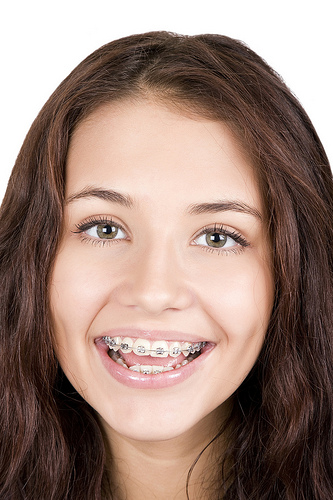June 24th, 2014

More than one patient has come into our office and asked, “What can I do to help my teeth when wearing Invisalign?”
While everyone’s teeth and dental needs are different, there are certain things everyone can do to make wearing their Invisalign aligners a more rewarding experience. Always follow the list of instructions and tips from Dr. Jeff Loveless, and add the following advice to your daily routine.
Always ask us about teeth whitening. Our team at Prairie Ridge Orthodontics knows how important it is for you to keep your teeth white and stain-free from the foods and drinks you consume daily. If you have attachments to your teeth, they will not whiten properly. Ask our office about teeth whitening when wearing your aligners; it might be best to wait until your treatment is complete.
Continue flossing every day. You should be flossing in any case. But it can be easy to assume that Invisalign will protect your teeth from bacteria. This is not true. Bacteria can get behind the aligners and affect the health of your teeth and gums, so keep up with your flossing schedule.
Follow the 48-hour rule when wearing your aligners. When you insert every new set of aligners, you should leave them in as much as possible during the first 48 hours. Your teeth will move more during this timeframe, and the aligners do the most good during this time.
You may experience slight discomfort while wearing your Invisalign aligners. You can take a pain reliever to help with the discomfort, but if you experience too much pain, please give us a call at our convenient Faribault, Zumbrota, or Owatonna, MN office to schedule an appointment!
June 17th, 2014

While everyone understands that a dentist takes care of teeth, not everyone is aware of what an orthodontist does. This confusion sometimes leads to misunderstandings about what Prairie Ridge Orthodontics does for our patients and how exactly Dr. Jeff Loveless can help them. Let’s take a closer look at a couple of the myths and misconceptions about orthodontists.
Perhaps the biggest misconception about the orthodontist is that they’re just like your family dentist. The truth is, they’re actually very different. While it’s true that both orthodontists and dentists care about helping you enjoy a lifetime of good dental and oral health, orthodontists go about achieving this goal in different ways. For instance, if you need to have a cavity filled, you probably won’t make an appointment to see an orthodontist. Dentists are the health professionals to see if you’re concerned about a cavity or need a filling. A dentist can also treat gum disease, tooth decay, toothaches, and other common oral health problems.
People see an orthodontist for very particular services. Most of the patients we see on a daily basis are here because they have braces, or they need to be fitted with braces or another form of tooth-straightening device. In other words, they consult an orthodontist when they are concerned about the alignment of their teeth. As a child grows up, his or her teeth may come in crooked. This can happen for a number of reasons, so it’s important for an orthodontist to take a look at a child’s teeth at about seven years of age. At that age, it’s possible to detect any problems that have not become too advanced to treat easily. Your family dentist may also refer your child to an orthodontist once the adult teeth have fully grown in.
Another common misconception about orthodontists is that they only treat children. It’s true that when you visit an orthodontic clinic you’re apt to see a lot of young kids, but you’ll also see teenagers, college students, and adults. Because crooked teeth can be caused by a number of different factors, it’s entirely possible for someone to require orthodontic treatment at any age.
If you want to know more about the practice of orthodontics or what your orthodontist can do for you, then simply ask Dr. Jeff Loveless. It’s best to get answers to your specific questions directly from the person who will be treating you. While you’re sure to find Internet resources helpful, there really is no substitute for the personal attention you’ll get during your appointment at our Faribault, Zumbrota, or Owatonna, MN office.
June 10th, 2014

At Prairie Ridge Orthodontics, we proudly treat adults, teens, and children; no matter what your age, we believe you deserve a great smile. Our warm and welcoming team is known for their for their exceptional orthodontic skills. Dr. Jeff Loveless and our talented team have been creating beautiful smiles for years, and today would like to ask: what do you love about your new smile? How has your smile improved your life?
Whether you’ve just come in for an initial orthodontic consultation with Dr. Jeff Loveless or your family has been visiting office for years, we would love to hear your thoughts about your treatment. In fact, we encourage you to leave a few words for us below or on our Facebook page!
We look forward to reading your feedback!
June 3rd, 2014

The community health awareness group Oral Health America has reported that 82 percent of adults are unaware of the role that infectious bacteria can play in tooth decay or cavities, and almost three out of five children aged 12 to 19 have tooth decay. Since June is National Smile Month, Dr. Jeff Loveless and our team at Prairie Ridge Orthodontics thought we’d remind our patients about the importance of good oral hygiene visits between office visits.
To keep your family’s smiles healthy and beautiful for years to come, be sure to:
- Brush at least twice a day with fluoride toothpaste
- Floss every day to clean between your teeth
- Eat a healthy, well-balanced diet
- Reduce your intake of sugary foods and drinks
- Visit Dr. Jeff Loveless for scheduled appointments
If you want to know more about healthy home care habits, feel free to ask our team at your next appointment, or ask us on Facebook!



